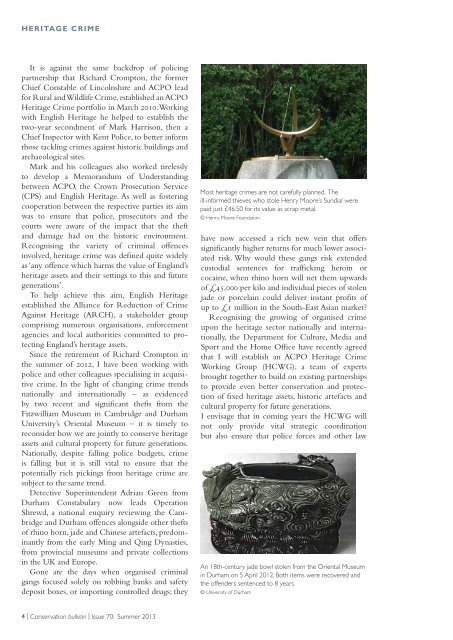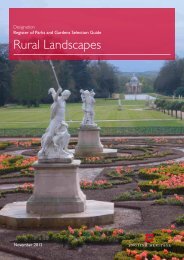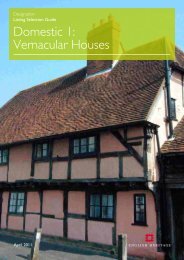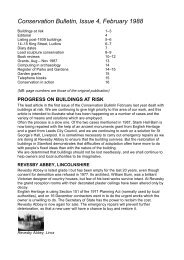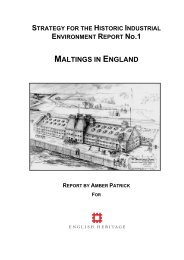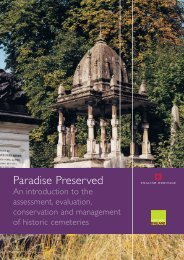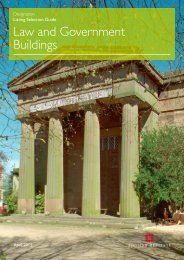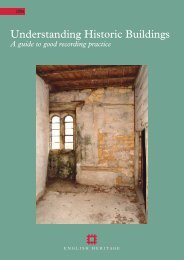Conservation Bulletin 70 | PDF - English Heritage
Conservation Bulletin 70 | PDF - English Heritage
Conservation Bulletin 70 | PDF - English Heritage
Create successful ePaper yourself
Turn your PDF publications into a flip-book with our unique Google optimized e-Paper software.
HERITAGE CRIME<br />
It is against the same backdrop of policing<br />
partnership that Richard Crompton, the former<br />
Chief Constable of Lincolnshire and ACPO lead<br />
for Rural and Wildlife Crime, established an ACPO<br />
<strong>Heritage</strong> Crime portfolio in March 2010. Working<br />
with <strong>English</strong> <strong>Heritage</strong> he helped to establish the<br />
two-year secondment of Mark Harrison, then a<br />
Chief Inspector with Kent Police, to better inform<br />
those tackling crimes against historic buildings and<br />
archaeological sites.<br />
Mark and his colleagues also worked tirelessly<br />
to develop a Memorandum of Understanding<br />
between ACPO, the Crown Prosecution Service<br />
(CPS) and <strong>English</strong> <strong>Heritage</strong>. As well as fostering<br />
cooperation between the respective parties its aim<br />
was to ensure that police, prosecutors and the<br />
courts were aware of the impact that the theft<br />
and damage had on the historic environment.<br />
Recognising the variety of criminal offences<br />
involved, heritage crime was defined quite widely<br />
as ‘any offence which harms the value of England’s<br />
heritage assets and their settings to this and future<br />
generations’.<br />
To help achieve this aim, <strong>English</strong> <strong>Heritage</strong><br />
established the Alliance for Reduction of Crime<br />
Against <strong>Heritage</strong> (ARCH), a stakeholder group<br />
comprising numerous organisations, enforcement<br />
agencies and local authorities committed to protecting<br />
England’s heritage assets.<br />
Since the retirement of Richard Crompton in<br />
the summer of 2012, I have been working with<br />
police and other colleagues specialising in acquisitive<br />
crime. In the light of changing crime trends<br />
nationally and internationally – as evidenced<br />
by two recent and significant thefts from the<br />
Fitzwilliam Museum in Cambridge and Durham<br />
University’s Oriental Museum – it is timely to<br />
reconsider how we are jointly to conserve heritage<br />
assets and cultural property for future generations.<br />
Nationally, despite falling police budgets, crime<br />
is falling but it is still vital to ensure that the<br />
potentially rich pickings from heritage crime are<br />
subject to the same trend.<br />
Detective Superintendent Adrian Green from<br />
Durham Constabulary now leads Operation<br />
Shrewd, a national enquiry reviewing the Cambridge<br />
and Durham offences alongside other thefts<br />
of rhino horn, jade and Chinese artefacts, predominantly<br />
from the early Ming and Qing Dynasties,<br />
from provincial museums and private collections<br />
in the UK and Europe.<br />
Gone are the days when organised criminal<br />
gangs focused solely on robbing banks and safety<br />
deposit boxes, or importing controlled drugs; they<br />
Most heritage crimes are not carefully planned. The<br />
ill-informed thieves who stole Henry Moore’s Sundial were<br />
paid just £46.50 for its value as scrap metal.<br />
© Henry Moore Foundation<br />
have now accessed a rich new vein that offers<br />
significantly higher returns for much lower associated<br />
risk. Why would these gangs risk extended<br />
custodial sentences for trafficking heroin or<br />
cocaine, when rhino horn will net them upwards<br />
of £45,000 per kilo and individual pieces of stolen<br />
jade or porcelain could deliver instant profits of<br />
up to £1 million in the South-East Asian market?<br />
Recognising the growing of organised crime<br />
upon the heritage sector nationally and internationally,<br />
the Department for Culture, Media and<br />
Sport and the Home Office have recently agreed<br />
that I will establish an ACPO <strong>Heritage</strong> Crime<br />
Working Group (HCWG), a team of experts<br />
brought together to build on existing partnerships<br />
to provide even better conservation and protection<br />
of fixed heritage assets, historic artefacts and<br />
cultural property for future generations.<br />
I envisage that in coming years the HCWG will<br />
not only provide vital strategic coordination<br />
but also ensure that police forces and other law<br />
An 18th-century jade bowl stolen from the Oriental Museum<br />
in Durham on 5 April 2012. Both items were recovered and<br />
the offenders sentenced to 8 years.<br />
© University of Durham<br />
4 | <strong>Conservation</strong> bulletin | Issue <strong>70</strong>: Summer 2013


